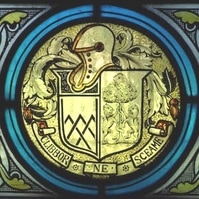

Cliburn family crest and motto
The manor of Cliburn originally comprised two moieties — Cliburn Hervey and Cliburn Tailbois — probably named after their original owners. By the 15th century these moieties became unified through marriage. The lords of the manor of Cliburn eventually adopted "de Cliburne" as their surname. Lordship of the manor descended in that family until, by then impoverished, they sold Cliburn Hall and manor in 1654 to Robert Collingwood. Two years later Cliburn Hall and manor were sold to Robert Sawrey and very soon thereafter Cliburn was bought by Edward Lee.
Mr Lee then used Cliburn Hall and manor to secure a loan by mortgage from Sir John Lowther. By 1667, he had defaulted on the repayments and in September 1667 Sir John Lowther bought Cliburn Hall and manor. Lordship of Cliburn then descended in the Lowther family, and thereby it became part of Earls of Lonsdale's massive estate in the north of England.
In 1589, when Appleby was overcome by the plague, its market was held at Gilshauglin to the west of the village. The site is now known as Little Appleby.
St Cuthbert's church has a 12th century nave and chancel. It was substantially renovated, a south aisle added and the gabled porch rebuilt in the 19th century. The porch incorporates two inscribed Roman stones and medieval coffin lids. After visiting Cliburn to research his family history, Admiral CJ Cleborne (1838–1909) of the US Navy donated several items to the church in return for the hospitality he received. These include a font cover, three memorial windows and a plaque.
A free school was endowed in 1807 and the building completed in 1809 adjacent to the church and old rectory. The school was rebuilt in 1877 on a new site north of the village crossroads. It closed in 1983.
A Wesleyan Methodist Chapel was built in 1832, but when it closed in 1974 (now a private dwelling) there were only three active Methodists in the parish.
The population of Cliburn peaked in the mid-19th century because of an influx of workers building the new railway and station to the north of the village. Cliburn station opened in June 1862 and closed in September 1956, the entire line closing in January 1962.
Cliburn had two public houses — the Kings Arms (closed in the late 19th century and became Midtown Cottage) and the Joiners Arms, subsequently renamed the Railway Inn and then the Golden Pheasant (now closed). There was also a Post Office, which opened in 1856, a garage and a shop — all now closed.
The first village hall was relocated from Haweswater where it was used for workers building the dam. It was demolished to make way for the new village hall which opened in 2002.
Winderwath, a detached portion of the parish, was recorded as a medieval village in 1279. According to local legend, it was exchanged for Julian's Bower by Roger the second Lord Clifford so that his mistress Juliana could reside in the same parish (Brougham) as himself. A chapel at Winderwath was recorded in 1343 as being annexed to St Cuthbert's church, but by the 18th century no trace remained.